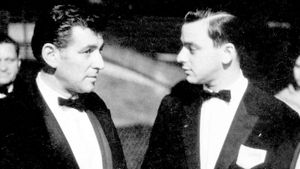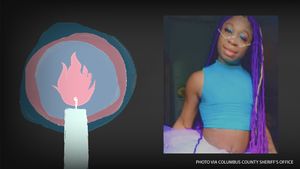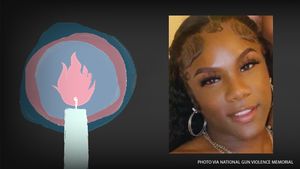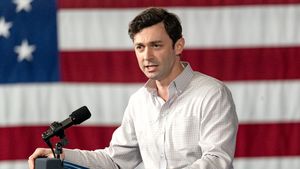The documentary Greg Louganis: Back on Boardwas a hit at festivals a year ago, but with its debut on HBO Sports this week, the heartbreaking story of one of America's greatest athletes will finally reach millions of households who may not be aware of the diver's ups and downs since he was in the spotlight.
Directed by Cheryl Furjanic and produced by Furjanic and Will Sweeney, the film about the four-time Olympic gold medalist comes at a pivotal time when acute attention is being paid to LGBT athletes, especially after Caitlyn Jenner came out as trans this year and the debut of the docuseries I Am Cait on E! is creating heightened trans awareness. The fact that some have questioned whether Jenner deserved her medals after the revelation, is a sore point for Louganis as well since people had tried to take his medals after coming out as HIV-positive. But it was Louganis's husband, Johnny Chaillot who informed Louganis of the similarity.
"I had no idea since I don't read my press," Louganis explains, while sipping coffee in a Midtown New York City hotel with his dog Dobby at his feet. "I had competed in the '88 Seoul Olympics while HIV-positive, and some people said I shouldn't have been allowed in the country. I'm kind of glad I didn't know it, but it made me think: How can you deny somebody, especially a physical achievement like that? You can't take that performance away. It stands on its own."
Chaillot and Louganis were married in California in the fall of 2013 -- and it's a happy turning point included in the film -- and since then, Chaillot has helped Louganis get many of his affairs in order and donated a trove of memorabilia to the National LGBT Museum, which plans to open its doors in New York City in 2019. "They now have the largest collection of Greg Louganis memorabilia collection in the world," Chaillot says. "Hopefully they are going to do a preview of Greg's stuff since next year since it's an Olympic year. We kept some of the bigger items" -- including medals from each of the Olympics -- "But we donated items like Speedos he wore in competitions and the 1988 sweater he wore in Seoul, so these things would be in a place where the whole world can see them."
Since the film begins with Louganis in dire financial straits and about to lose his Malibu home, we wanted to know how his life has changed since the filming took place and find out where he's living these days.
Out: Was it odd that the film starts with you and the house and your financial situation?
Greg Louganis: When I first saw it, I got a little nervous. I think it was important to tell the story because it wasn't unique: This was happening across the country with loans and the 2006 black mold scare. I know how empowering it can be to know that someone else has been through that. I think it was an important story to tell within the documentary. But we sold the house last year. It was kind of bittersweet, I lived there 29 years. But now we're completely out of debt. I was able to pay my taxes, my loan, paid for our wedding. Now we have a whole new fresh start.

In many ways, the message of the film seem to be a cautionary tale for athletes and families of athletes to make them aware that you aren't going to be "golden" your entire life.
Right. That's why I wanted to talk about mentoring U.S. divers. It's not just about getting to the Olympics and performing well at the games. What happens after? When you retire from your sport, you're still pretty young and you almost lose your identity. To go through that process of: Now what do I do? I didn't know what my passion was going to be. I've seen it with the other athletes, you reach a certain age, and you need something else to move to.
One of the more poignant lines from the documentary is when you explain that, having a coach who told you what to do, you never had to think about how to live your life. Do you have any advice for people who have that sort of relationship so it doesn't necessarily translate into other parts of their lives?
My coach was trustworthy, and I trusted him. We were together for 10 years, so I trust him implicitly. I always knew he had my best interest at heart, but in the "real world" not everyone is trustworthy, so that was a real hard lesson for me to learn. I kept making the same mistakes again and again, but I needed to learn those lessons. I don't have any regrets, but I would like, in an ideal world, for other athletes and performers and whomever would hear that and not make the same mistakes. Part of that is learning what questions to ask or doing the research, now that we have the Internet, you can look people up and do background checks.
SLIDESHOW: Champions: Heroes, Past and Present, Who Play For Our Team
One of the other details revealed in the doc that I didn't know about: You never had a Wheaties box. I know it's not the biggest accoldate, but I never realized that you were overlooked in that way.
You know what, I didn't either until I was working with Cheryl on the documentary, and we were at the International Swimming Hall of Fame where they had all the Wheaties boxes lined up of all the aquatic athletes. It's box after box after box, of some rather obscure names, and I'm going, "Oh my god, I am nowhere in that group."
What did that feel like to realize that oversight?
Well that first came out with the book in '95. I thought, Oh yeah, whatever. I didn't really know the significance of it until we started working on Back on Board and I saw all the boxes and realized, I'm not there. That was the first time it really struck me what the significance of that was. I realized why people were upset.
But two of the reasons you thought were that there were rumors that you were gay or you felt you weren't "All-American" enough. But that made me think about people wondering if that would affect Caitlyn Jenner in some way: Would Wheaties do something now that she came out as transgender or would the OIC take away her medals?
I marched in the opening ceremonies with Bruce in 1976. I was on the Tour of Champions with Medco, and they always put me with Bruce and Mark [Spitz], and between the two of them I couldn't get a word in edgewise. I know these people. Then the whole Kardashian thing. I don't watch TV so I don't know, I haven't seen the show.
I wasn't sharing the Caitlyn sensationalism angle, but I read about trans-exploitation, a term I had heard before, and discussed it with Johnny and what the implications can be. So that was news to me. I did Larry Kramer's Just Say No with Alexandra Billings, and Alexandra taught me so much about her journey transitioning. That's been my education. The thing about it is we talk about the LGBT community, but we're really not informed as a community. I know a lot about the G, and I have wonderful relations with the L in LGBT, but the B, I'm not quite as sure, but I have a better sensitivity to it by viewing sexuality as much more fluid. But I knew nothing about the T in LGBT, so to do that show with Alexandra, I had an education and how to talk respectfully. It's almost like learning a whole new language. Also, RuPaul is a friend. And RuPaul, he or she, it's whatever I'm dressed as, that's how you address me.
Personally, I kind of bristle with the whole "girlfriend" and "she" thing. Someone called me "Oh, girl" or "her" or something like that. And I said, "Excuse me?" I said I'm a man and I'm proud to be a man. I appreciate camp and there's a time and a place for that but to somebody you don't know, it can be rather inappropriate.
RELATED | VOWS: Greg Louganis & Johnny Chaillot
One of the happiest moments takes place after we see you selling off your memorabilia and medals to save your house, and then you meet Johnny, and you find happiness. Was that something you think the filmmakers were looking for?
I wasn't in the editing process at all. I relinquished all the creative control, but having built that relationship with Cheryl, she was like my therapist who I would go to. And the crew, too. They lived with us through this, too. One of the crewmembers was going through the same thing I was going through. I just reconnected with him recently and I found out he was also able to get out of the debt and sell his house and he's moved on.
Now Johnny and I are very cautious about her finances. We're living well within our means so we can put money aside. We know where we're at right now is temporary [Chaillot's one-bedroom Beverly Hills apartment, which he describes as cramped, but "very Gloria Swanson.] It's affordable and we don't have to worry where the next job is coming from. We don't have that pressure. With that lifted, it enables us to have much more freedom.
Greg Louganis: Back on Board debuts Aug. 4 at 10 p.m. on HBO. Watch a clip below:

























































































